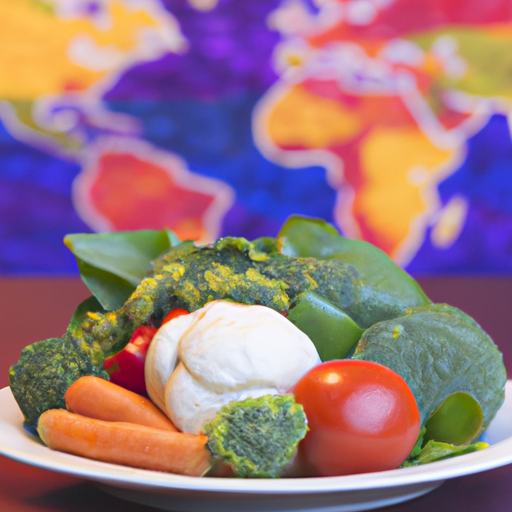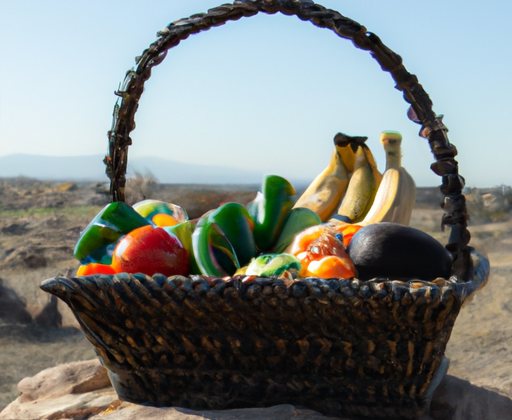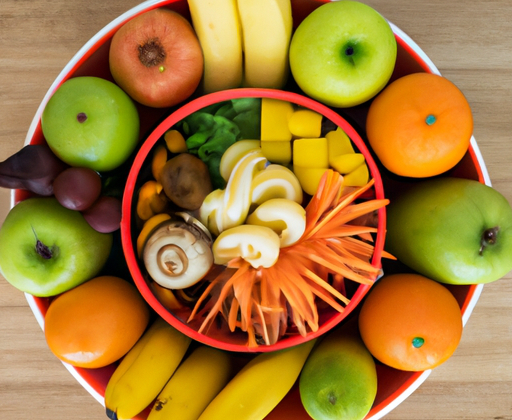Food and the environment go together like two peas in a pod. Take one away and the other just doesn’t quite feel right. But what exactly do we mean when we talk about food and environment? Well, it’s all about how our relationship with nature has an impact on what we eat and vice versa. Here’s a quick guide to this fascinating topic!
Food is fundamentally connected to the natural world — from where it comes from, to how it’s grown and processed. In this modern age, our actions as consumers of food can have far-reaching effects on our planet’s climate, land, water, biodiversity, and air quality.
The relationship between food and the environment has been a part of human life for centuries. From medieval times, when the peasants operated small farms out of necessity, to today, when supermarkets offer a dizzying array of choices from around the world, humans have had to make decisions about what to eat that have consequences for the planet.
But understanding this relationship is more complicated than ever before. That’s why it’s so important to learn about the environmental impacts of different types of food production. Doing so will help us make better decisions when it comes to the foods we purchase, the methods of transport they use, and even the packaging they come in.

So let’s dive into the wild world of food and environment and explore how our choices shape the world we live in!
Impact of Climate Change on Agriculture
It’s no secret that climate change is having a major impact on agriculture – it’s getting warmer, there are more droughts, and the soil isn’t doing so hot either. But what, exactly, are the changes we’re seeing?
First off, temperatures are steadily rising all over the world. This means hotter summers and wetter winters, which can really put a strain on farmers. Plants need just the right amount of heat and moisture in order to flourish, but if things get too extreme they become stressed out – and when plants are stressed out, crop yields go down.
Changes to rainfall patterns are another effect of climate change. With more extreme weather we’re seeing heavier rains in some areas and longer periods of drought in others. This sort of variability can cause huge problems for farmers; crops grown in too little water will suffer, while those grown in too much may drown.
The last thing that climate change does to agriculture is damage the soil. Soil health depends on the balance between plants, animals, and microorganisms. But when temperatures rise and rainfall patterns change, this balance is thrown off, leading to soil becoming degraded (i.e. not good for growing anything).
How Food Production Impacts the Environment
No doubt y’all have heard of some way food production messes with the environment. But to what extent? Well, it ain’t just bibbity-bobbity-boo. It’s serious business. Let’s break down a few of the big impacts our meals have on the planet.
First off, water usage. For many crops, irrigation is a must. So much so that it accounts for about 90% of the world’s freshwater utilization. And if that water ain’t used smartly – like recycling wastewater or using drought-tolerant plants – then it can definitely take a toll on ecosystems.
Unsustainable farming practices don’t help matters none either. We’re talking about stuff like monocropping and toxic pesticide use. Both not only harm the environment but also contribute to soil degradation, which can lead to decreased crop yields. Not cool!
Fertilizers and pesticides aren’t great either. They can poison ground or surface water, contaminate air, trigger air pollution, and even produce dead zones in waterways. It’s no wonder they’re known as environmental contaminants.
So yeah, food production has some serious environmental ramifications. That’s why it’s important that we take action to reduce its footprint.
Solutions to Reduce Environmental Impact
Let’s face it, our planet is in trouble. And while many of the problems we’re facing are big and complicated, we can start to make a difference right now by taking action on our food production practices. It may sound daunting, but there are solutions out there – solutions that can help us preserve the environment, limit climate change and protect our delicate ecosystems for years to come.
First things first: if we want to reduce our environmental impact, we need to adopt sustainable farming practices. This means choosing responsible watering methods like drip irrigation or reusing rainwater from reservoirs. It also means avoiding chemicals and minimizing the use of fertilizer. Instead, opt for more natural growing methods like cover crops that build healthy soils and keep nutrients where they belong.
Next, one of the most effective ways to reduce our environmental impact is by switching to plant-based diets. Eating fewer animal products (like beef, chicken, pork or eggs) not only reduces carbon emissions but also saves on water usage and helps lessen the strain on our landfills. From lentils to chickpeas, fruits and veggies, there are plenty of options that are both delicious and sustainable.
Finally, reducing food waste is another great way to support our planet. Whether it’s composting leftovers or donating surplus food to those in need, simple habits like these can go a long way. There are also lots of apps available that help you meal plan and track expiration dates so you don’t end up throwing away food unnecessarily.
Conclusion
It’s clear that food production has a massive impact on our environment. The climate crisis, unsustainable agricultural practices, and the overwhelming consumption of animal-based products all contribute to water pollution, soil degradation, and ultimately, global warming. That being said, there are some simple steps we can take to reduce our environmental footprint.
For starters, we should adopt sustainable farming methods like crop rotation and composting. Eating a plant-based diet can also make a big difference, as well as reducing food waste. Finally, by educating ourselves on how food impacts the planet, we can become more conscious consumers, taking action to protect our land, air, and water for future generations.
All in all, it’s important to remember that our relationship with food has real consequences — both positive and negative — for our environment. With that knowledge, let’s come together and make sure our world stays one we’re proud to live in!
Food and Environment FAQ
What is the relationship between environment and nutrition?
As someone who’s studied the relationship between nutrition and environmental sustainability for quite a while, I can tell you that food has a huge impact on our environment. If we don’t make an effort to promote healthier, greener eating habits, the consequences could be disastrous.
For example, the production of certain foods uses up a lot of energy and can cause pollution. Livestock production, for example, is responsible for 18% of the world’s greenhouse gases, making it one of the leading causes of climate change. And large-scale monoculture farming is a major contributor to deforestation, soil erosion and water contamination.
On the other hand, eating local, seasonal and organic food helps protect the environment. It reduces your carbon footprint, preserves biodiversity and reduces soil erosion. Eating plant-based foods is also beneficial as it requires fewer resources to produce and requires less energy to transport.
So, if you want to be kinder to the environment, it’s important that you make an effort to eat more sustainable and sustainable foods. Eat locally-grown, seasonal and organic produce, eat fewer animal products and processed foods, and try to cut down on food waste. It’s the little things that can make a big difference!
How would you describe the relationship between our food choices and environmental issues?
I’m tellin’ ya, the relationship between food and the environment is huge. First off, what you choose to eat has a direct impact on the environment. Whether it’s buying local, organic, or sustainably-sourced food, those decisions make a big difference. For example, local food doesn’t need to be transported across the world, which reduces emissions and cuts down on fuel use. Organic food is grown without pesticides and other artificial chemicals, which are bad for the environment. And sustainably sourced food supports small-scale farmers who are often stewards of the land, taking good care of their land and using fewer resources.
That said, food itself is an environmental issue. From emissions to waste, food production has a huge negative impact on the environment. It takes a lot of energy and water to produce food, and that energy release can create air and water pollution. When food is wasted, it’s not only an economic issue, but it also means all the energy used to produce it was for nothing. On top of that, crops grown for animal feed and animal products are often grown in environments that are not environmentally friendly, leading to deforestation and habitat loss.
In short, it’s pretty clear-cut: choose your food wisely, and you can be part of the solution. Take the time to research what went into the food you’re eating, and strive to make conscious decisions about the food you put into your body. It may not seem like it matters, but you can make a big difference by being mindful of your environmental impact when it comes to food.
How is food an environmental issue?
As someone who’s spent a lifetime examining the intersection of the environment and food, I can tell you that the two are irrevocably intertwined. Our environment is the source of our food and food production can, in turn, heavily impact our environment.
Take agriculture, for example. When done responsibly, it can help restore soil fertility, protect waterways and restore species. But when done irresponsibly, it can lead to water and air pollution, soil erosion and loss of biodiversity.
In addition, the way we produce and consume food can have a knock-on effect on our environment. A lot of food wastage and the methods in which food is transported and stored can contribute to an increase in emissions; factory farming often relies heavily on fossil fuels and livestock production can be responsible for to excessive water use and water pollution.
The relationship between food and the environment is a very complex one. We need to be mindful of how we grow, produce and consume food if we want to ensure that our environment is well-protected and that our food is safe and sustainable for future generations.

